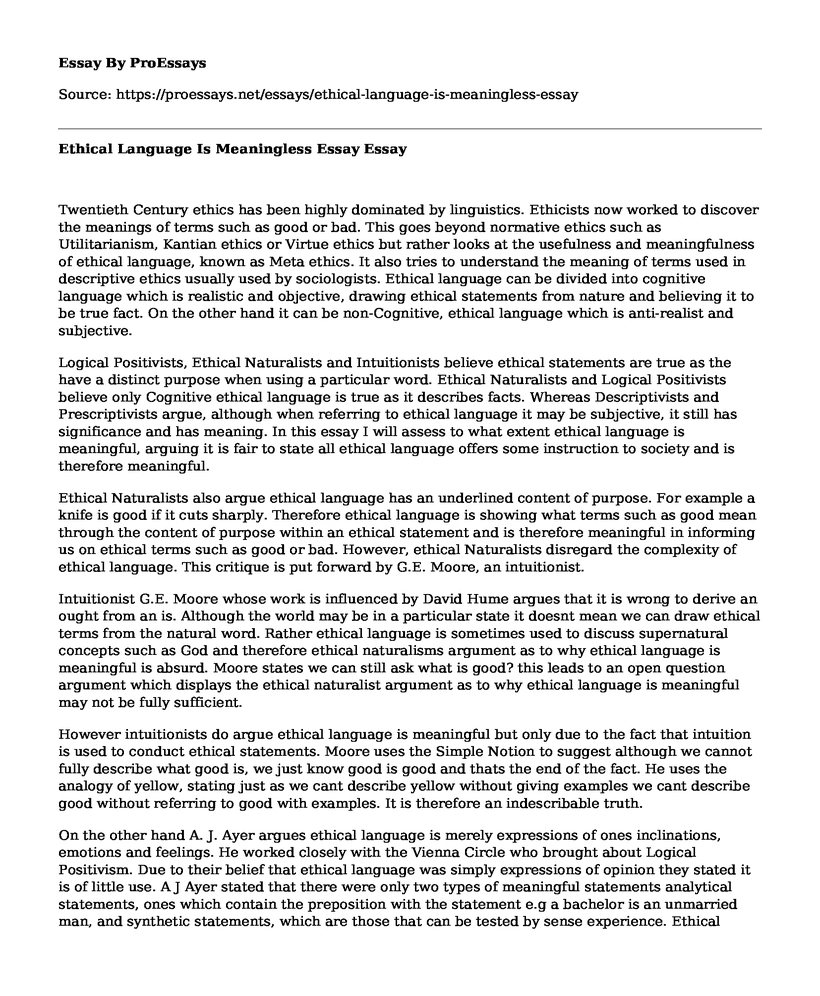Twentieth Century ethics has been highly dominated by linguistics. Ethicists now worked to discover the meanings of terms such as good or bad. This goes beyond normative ethics such as Utilitarianism, Kantian ethics or Virtue ethics but rather looks at the usefulness and meaningfulness of ethical language, known as Meta ethics. It also tries to understand the meaning of terms used in descriptive ethics usually used by sociologists. Ethical language can be divided into cognitive language which is realistic and objective, drawing ethical statements from nature and believing it to be true fact. On the other hand it can be non-Cognitive, ethical language which is anti-realist and subjective.
Logical Positivists, Ethical Naturalists and Intuitionists believe ethical statements are true as the have a distinct purpose when using a particular word. Ethical Naturalists and Logical Positivists believe only Cognitive ethical language is true as it describes facts. Whereas Descriptivists and Prescriptivists argue, although when referring to ethical language it may be subjective, it still has significance and has meaning. In this essay I will assess to what extent ethical language is meaningful, arguing it is fair to state all ethical language offers some instruction to society and is therefore meaningful.
Ethical Naturalists also argue ethical language has an underlined content of purpose. For example a knife is good if it cuts sharply. Therefore ethical language is showing what terms such as good mean through the content of purpose within an ethical statement and is therefore meaningful in informing us on ethical terms such as good or bad. However, ethical Naturalists disregard the complexity of ethical language. This critique is put forward by G.E. Moore, an intuitionist.
Intuitionist G.E. Moore whose work is influenced by David Hume argues that it is wrong to derive an ought from an is. Although the world may be in a particular state it doesnt mean we can draw ethical terms from the natural word. Rather ethical language is sometimes used to discuss supernatural concepts such as God and therefore ethical naturalisms argument as to why ethical language is meaningful is absurd. Moore states we can still ask what is good? this leads to an open question argument which displays the ethical naturalist argument as to why ethical language is meaningful may not be fully sufficient.
However intuitionists do argue ethical language is meaningful but only due to the fact that intuition is used to conduct ethical statements. Moore uses the Simple Notion to suggest although we cannot fully describe what good is, we just know good is good and thats the end of the fact. He uses the analogy of yellow, stating just as we cant describe yellow without giving examples we cant describe good without referring to good with examples. It is therefore an indescribable truth.
On the other hand A. J. Ayer argues ethical language is merely expressions of ones inclinations, emotions and feelings. He worked closely with the Vienna Circle who brought about Logical Positivism. Due to their belief that ethical language was simply expressions of opinion they stated it is of little use. A J Ayer stated that there were only two types of meaningful statements analytical statements, ones which contain the preposition with the statement e.g a bachelor is an unmarried man, and synthetic statements, which are those that can be tested by sense experience. Ethical statements do not fit into either of these categories and were therefore largely not meaningful to the Logical Positivists. Many may argue that this is a pessimistic and limited view of ethical language.
Conclusion
In addition Hare goes beyond descriptivism, stating ethical statements are actually prescriptive and therefore meaningful as they can act as imperatives. Not only are they saying boo to murder or hurrah to charity but stating I wouldnt steal, so neither should you or I will give to charity so so should you. In this sense ethical language is meaningful as not only does it provide universal norms or arouse feeling but place imperatives on what one sees as wrong or right, therefore offering some sense of guidelines to act ethically and morally. However one may argue why should one imperative be chosen over another?
Cite this page
Ethical Language Is Meaningless Essay. (2022, Jul 15). Retrieved from https://proessays.net/essays/ethical-language-is-meaningless-essay
If you are the original author of this essay and no longer wish to have it published on the ProEssays website, please click below to request its removal:
- Addressing Problems of the ESL Students
- Course Work on Teaching: Case Study of Jon's Social Development
- Essay Sample on Early Child Development: Caring for Vulnerable Children in Their Early Stages
- Family Role Model Personal Essay Example
- Constructivism in Early Childhood Learning: Active Participation & Responsibility - Essay Sample
- Essay Example on Children's Essentialism: Beliefs on Psychological Traits
- Research Paper Example on Unlocking the Benefits of Internationalizing Higher Education







